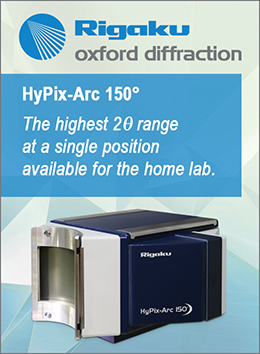


Meeting report (IUCr supported)
Sixth International School of Crystallization
![ISC2018 Alhambra [ISC2018 Alhambra]](https://www.iucr.org/__data/assets/image/0014/141125/ISC18-Alhambra.jpg)
A group of students and teachers inside the Alhambra Palaces.
The 6th International School of Crystallization: Drugs, Foods, Agrochemicals, Minerals, New Materials (ISC2018) took place from 20 to 25 May in the centre of the beautiful city of Granada, Spain, an ideal place to promote close scientific and social interactions between the attendees. The school was organised by the Laboratory of Crystallographic Studies (CSIC-UGR) under the auspices of the IUCr through the Crystal Growth and Characterization of Materials Commission and the Teaching Commission, with the support of the International Doctoral Summer School Programme of the School of Science, Technology and Engineering of the University of Granada, the Spanish Specialized Group of Crystallography and Crystal Growth (GE3C) and the Excellence Network of Crystallography and Crystallization “Factoría de Cristalización”. The School gathered postgraduate/postdoctoral students as well as research scientists from industry and academia that deal routinely with crystallization processes but seek fundamental knowledge on the crystallization phenomena and the behaviour of crystallizing solutions. Students from all over the world were invited to learn from top quality international speakers, to hear case study presentations, to watch practical hands-on demonstrations and to present their research results in the purposely dedicated poster sessions.
Attendance
The turnout of the School was excellent with 104 participants from 17 countries, including 50 students. Considerable effort was made to provide financial support to as many students as possible; in fact, all grant applications were accepted for funding. Remarkably, most of the granted students came from outside Spain.
Programme
ISC2018 covered five days of lectures and practical demonstrations carried out by 29 selected experts in fields directly related to crystallization. The main topics were solution properties, nucleation: classical and non-classical approaches, crystal growth kinetics and mechanisms, crystallization routes, crystallization techniques, crystal morphology, mineral textures, polymorphism, hydrates and solvates, crystallization screening, industrial (mass) crystallization, crystallization in microfluidics, chirality, biomineralization, mesocrystals, nanocrystals and co‐crystals.
The first day of the School dealt with the fundamentals of crystallization from solution encompassing a revision structure and properties of crystallizing solutions, nucleation theories, crystal growth kinetics and mechanisms, morphology and structural defects. The second day of the School focused on both classical and novel crystallization techniques including solution vs. gel growth, crystallization from melts and crystallization in microfluidic systems. There were also lectures on hollow crystals, mesocrystals and nanocrystallization. On Wednesday there were two markedly different sessions on special topics. While the morning session was devoted to discussing the fundamentals of polymorphism, co-crystallization and chiral crystallization, the afternoon was dedicated to biological crystallization. In the evening, Juan Manuel García-Ruiz gave a special talk on the symmetry of the Alhambra, which was followed by a night visit to the Alhambra Palaces.
Thursday was entirely dedicated to a ‘Demonstrations Fair’, at which 18 specialists offered short (20-40 minutes) practical sessions periodically at scheduled times. Participants could choose what sessions they wanted to attend and in the order they wished, so that they selected their own learning programme “a la carte”. The Demonstrations Fair proved to be an excellent teaching tool as it provided students with plenty of opportunities to interact on a personal basis with tutors and to watch closely how to perform crystallization experiments.
![[ISC2018 Demonstration Fair]](https://www.iucr.org/__data/assets/image/0019/141148/ISC2018-demonstration-fairs.png) Demonstration Fair: Left: Jürg Hulliger explaining crystal growth equipment for controlled growth from solution: temperature difference and evaporation technique. Right: Helmut Cölfen and Denis
Gebauer explaining how to analyse prenucleation clusters and synthesize mesocrystals.
Demonstration Fair: Left: Jürg Hulliger explaining crystal growth equipment for controlled growth from solution: temperature difference and evaporation technique. Right: Helmut Cölfen and Denis
Gebauer explaining how to analyse prenucleation clusters and synthesize mesocrystals.
On the last day there were lectures on special hot topics, including crystal engineering of task-specific materials, mineral assembly and analysis of the structural organization of mineralized tissues. In addition, there was a round table on “Classical vs. non-classical nucleation”, one of the most debated topics in crystallization nowadays. The round table was moderated by Lourdes Fernández Díaz, and featured Jim de Yoreo, Denis Gebauer, Christine Putnis and Giusseppe Falini.
The School closed with the presentation of poster prizes offered by the IUCr and the Crystallization Factory of the Laboratory of Crystallographic Studies.
Poster Sessions
Dynamic and lively poster sessions rounded off each day and proved to be a very valuable opportunity to discuss the scientific work. Students made a great contribution by presenting 44 posters. An international panel of lecturers decided to award five prizes for the best poster presentations. The two IUCr prizes went to Hans Hendrikse (AMOLF, the Netherlands) and Francesca Carella (Istec-CNR, Italy) while the three Crystallization Factory prizes were awarded to Panayiotis Klitou (University of Leeds, UK), Cristina Ruiz-Agudo (University of Konstanz, Germany) and Fabian Kurzeman (University of Innsbruck, Austria).
Social events
In addition to the scientific course, there was a parallel social programme, which consisted of a welcome cocktail on Sunday, a night tour of the Nazaries Palaces of The Alhambra on Wednesday and a Flamenco dinner party on Thursday in the Carmen de la Victoria in the Albayzin district.
Evaluation
Overall, the School was deemed to be very successful as judged by the majority of positive comments written in the evaluation form by the participants. The attendees were asked about three major items: the quality of the scientific programme, the Demonstrations Fair and the organisation.
Conclusions
According to the evaluation forms, the school was considered very valuable by the participants, partly because of the quality of the programme and partly due to the contribution of some of the best lecturers for the wide range of topics covered. All in all, the ISC2018 was an enriching experience for all of those involved, triggering several fruitful scientific discussions. The positive approach, the openness and the active participation of each of the participants made it a wonderful experience, worthy of being repeated in the future. We would like to express our gratitude to all of the participants; to the teachers for their full commitment and to the students and colleagues from academic and industrial backgrounds for believing in these Crystallisation Schools. We are very grateful to all the people who have worked very hard in preparing the Schools to make them successful. Last but not least, we would also like to express our gratitude to the sponsors and exhibitors for their great support.
A full report of the meeting is available here.
Copyright © - All Rights Reserved - International Union of Crystallography





